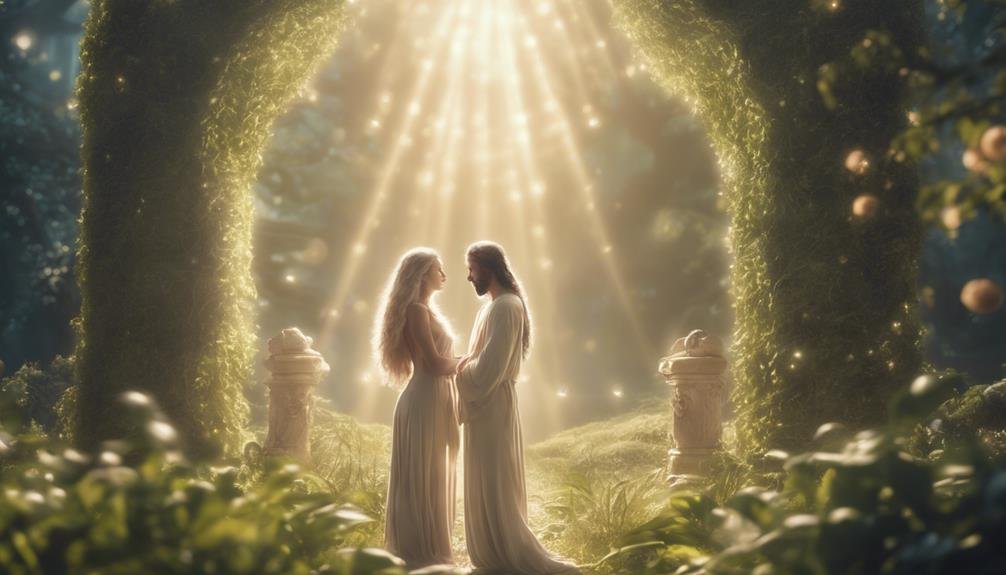When considering whether Adam and Eve went to heaven, you’re stepping into a fascinating theological debate. Some argue their repentance was essential for salvation, while others believe God’s grace alone could grant them entry.
The Bible provides indirect clues, like the garments of skin and the promise of redemption through Jesus Christ, which suggest deeper meanings. Did their ultimate fate entirely hinge on repentance, faith, or something else?
This question challenges your understanding of grace and personal responsibility, making you wonder about the balance between divine mercy and human action.
Key Takeaways
- Scriptures do not explicitly confirm whether Adam and Eve went to heaven.
- Their fate hinges on the importance of repentance and faith in God’s promises.
- God’s grace and mercy suggest potential for their salvation despite their sin.
- The garments of skin provided by God might symbolize atonement for Adam and Eve.
- Debates persist due to a lack of clear biblical evidence regarding their salvation.
Theological Perspectives

Diving into the theological perspectives, you’ll find diverse opinions on whether Adam and Eve went to heaven. Many believers argue that, based on biblical principles, they likely ascended to heaven.
The concept of repentance plays a significant role in these discussions. Some theologians believe that Adam and Eve must have repented for their original sin to secure their place in heaven. In contrast, others argue that God’s grace alone was sufficient for their salvation.
Theological discussions often focus on the uncertainty surrounding Adam and Eve’s acceptance of salvation. The Bible indicates God’s grace towards them but doesn’t explicitly confirm their fate.
This ambiguity fuels debates among scholars and believers alike. Did Adam and Eve receive salvation through repentance, or was it granted unconditionally by God? Another point of contention is whether God shows favoritism in determining Adam and Eve’s salvation.
Some argue that Adam and Eve might have had a unique relationship with God as the first humans. Others believe God’s justice would apply equally to Adam and Eve and all humanity. These diverse theological perspectives continue to spark rich debates within religious communities.
Biblical Evidence
In examining biblical evidence, you’ll find that the scriptures don’t explicitly confirm whether Adam and Eve went to heaven. The Bible is conspicuously silent on their ultimate fate. However, some passages offer indirect insights that fuel speculation.
For instance, the fact that God made garments of skin for Adam and Eve after their sin could symbolize a form of atonement. This act might imply that they received God’s grace.
Moreover, the narrative of their son Abel is remarkable. Abel offered a better sacrifice than Cain by faith, suggesting the importance of trust and sacrifice in one’s relationship with God.
This principle might extend backward to Adam and Eve, indicating that their salvation could be plausible if they exhibited faith and repentance.
The promise in Genesis 3:15 also plays a role where God speaks of the seed: He’ll bruise the serpent’s head. This prophecy of redemption through Jesus Christ could imply that Adam and Eve believed in this promise, holding faith in God’s ultimate plan.
While the Bible doesn’t provide a definitive answer on whether Adam and Eve went to heaven, these pieces of evidence allow for thoughtful discussion on their potential salvation.
Role of Repentance

While the Bible doesn’t explicitly confirm Adam and Eve’s fate, examining the role of repentance can shed further light on their potential salvation. Repentance is often viewed as an essential element for entry into heaven.
Acknowledging sin was the first step for Adam and Eve. After their disobedience in the Garden of Eden, recognizing the gravity of their actions was important.
Repentance involves not just feeling remorse but also turning away from sin. This means consciously avoiding repeating the same mistakes and aligning one’s life with God’s will.
For Adam and Eve, this would have involved a profound change of heart and a desire to restore their broken relationship with God.
Seeking forgiveness is another significant aspect of repentance. It shows an earnest wish to mend the rift their actions caused. Through forgiveness, Adam and Eve could have sought reconciliation with God, strengthening their hope for salvation.
While the scriptures don’t provide a clear answer, the role of repentance suggests that their sincere efforts in acknowledging sin and seeking to turn away from it could have played a significant role in their spiritual journey.
God’s Impartiality
God’s fairness guarantees that everyone is judged solely by their faith and actions, not their lineage or status. When Eve and Adam sinned by eating the forbidden fruit, they committed the first sin in the Garden of Eden.
This disobedience didn’t grant them any special exemptions from God’s judgment. Instead, their relationship with God and eventual fate, including the possibility of entering heaven, hinges on their repentance and faith in His promises.
You might wonder if Adam and Eve went to heaven simply because they were the first humans. However, God’s impartiality means He doesn’t show favoritism. Knowing God and understanding His ways is important for everyone, including Adam and Eve.
Their actions in response to their sin would determine their salvation, not their unique status in history. In God’s eyes, the mistakes made in the Garden of Eden are weighed against the same standards applied to all humanity.
Therefore, Adam and Eve’s ultimate destination would depend on their faith and repentance, aligning with God’s fair and unbiased nature in judging human souls.
Faith and Salvation

Faith and salvation are central themes when considering Adam and Eve’s ultimate fate. The Bible suggests that salvation is through faith in God. If Adam and Eve had believed in God’s promises, they might have secured their place in heaven.
God’s covering their shame with animal skins can symbolize forgiveness, pointing to their potential salvation. God’s promise of a seed to save humanity reflects His grace and mercy, offered to Adam and Eve just as it is to us.
Their acceptance of this provision could indicate their faith and, consequently, their entry into heaven. Although the Bible doesn’t explicitly state where Adam and Eve ended up, their faith in God’s promise could be a key factor in their salvation.
As we contemplate their fate, it’s important to remember that God’s plan of salvation hasn’t changed. It centers on faith, grace, and the redemption Jesus Christ offers.
Adam and Eve’s story reminds us of believing in God’s promises to save us. Their potential faith could be an example, highlighting that faith makes salvation and entry into heaven possible.
Conclusion
Diverse theological views exist on whether Adam and Eve went to heaven. Biblical evidence hints at the importance of repentance and faith alongside God’s grace.
Ultimately, their fate might rest on a balance of personal responsibility and divine mercy. You’re left to ponder how repentance, faith, and alignment with God’s will interplay in the broader context of salvation, reflecting the complex nature of divine justice and grace.
Related Articles:
Bloom Where You Are Planted: Thriving in Any Environment
Palm Sunday Customs: How Different Countries Celebrate
Ezekiel Biblical Angels: Exploring Celestial Beings in Scripture
FAQs
What does the Bible say about Adam and Eve’s afterlife?
The Bible does not explicitly mention whether Adam and Eve went to heaven after their death. While they sinned by disobeying God’s command in the Garden of Eden, the Bible also speaks of God’s mercy, grace, and the promise of redemption through a future Savior. This leaves room for interpretation about their ultimate fate.
Key Points:
- There is no direct biblical reference to their afterlife.
- Sin and disobedience in the Garden of Eden.
- Promise of redemption through a Savior.
Is there evidence that God forgave God has forgiven Adam and Eve?
Many theologians believe that God may have forgiven Adam and Even His actions after their sins:
- Symbolic Atonement: In Genesis 3:21, God made garments of animal skins to clothe Adam and Eve, which some interpret as a symbolic act of atonement for their sin.
- Promise of Redemption: The prophecy in Genesis 3:15 speaks of a future Redeemer who would crush the serpent’s head, hinting at a plan for salvation that includes all of humanity.
- God’s Grace: Throughout the Bible, God’s grace and forgiveness are central themes, suggesting that His mercy might have extended to Adam and Eve.
Evidence of Forgiveness:
- Garments of animal skins as symbolic atonement.
- Promise of a future Redeemer.
- God’s grace and forgiveness are recurring themes.
What do different Christian beliefs say about Adam and Eve’s fate?
Different Christian traditions have varying interpretations regarding the fate of Adam and Eve:
- Catholic Perspective: Catholics generally believe that God’s mercy and Christ’s redemption are available to all, including Adam and Eve, suggesting they may have received salvation.
- Protestant View: Many Protestants focus on salvation through faith alone. If Adam and Eve had faith in God’s promise of a Savior, they might have been saved.
- Orthodox Christian Belief: Orthodox Christians emphasize God’s infinite mercy and the idea of universal salvation, which could imply that Adam and Eve were granted forgiveness.
Christian Beliefs:
- Catholics trust in God’s mercy and redemption.
- Protestants emphasize faith in God’s promise.
- Orthodox Christians highlight universal salvation.
Could Adam and Eve have gone to heaven despite their sin?
The possibility that Adam and Eve went to heaven despite their sin lies in the belief in God’s redemption and forgiveness:
- God’s Mercy: The Bible repeatedly shows that God’s mercy is greater than human sin, suggesting that His forgiveness might have extended to Adam and Eve.
- Role of the Redeemer: The promise of a Savior, fulfilled by Jesus Christ, is believed to offer redemption to all of humanity, including those who first sinned.
- Repentance: If Adam and Eve repented for their disobedience and believed in God’s promise of salvation, they might have been granted entry into heaven.
Heavenly Possibility:
- God’s mercy surpasses sin.
- Jesus’ role as Redeemer includes all.
- Potential repentance and faith in God’s promise.
Is there a clear biblical answer about Adam and Eve’s fate?
The Bible does not clearly answer whether Adam and Eve went to heaven. The question remains a topic of theological discussion, with interpretations based on God’s grace, forgiveness, and the promise of redemption through Jesus Christ.
Conclusion:
- There is no clear biblical answer to their fate.
- Theological debate is based on God’s grace.
- Redemption through Jesus is central to belief.

